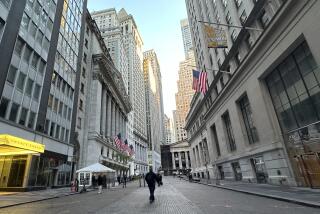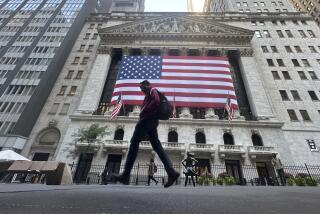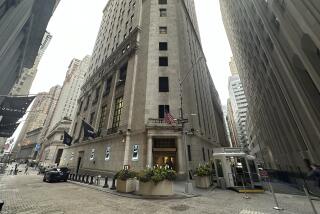German Rate Cut Helps to Boost Stocks
U.S. stocks rallied briskly Thursday with their European counterparts, as an interest-rate cut by Germany’s central bank was viewed as bullish for the global economy.
The Dow Jones industrial average jumped 43.65 points to 5,733.47, putting it withing 1% of its record high of 5,778.00 set on May 22.
The broader market also rose, with technology stocks leading the Nasdaq composite index of mostly smaller stocks up 17.12 points, or 1.5%, to 1,143.96.
Wall Street has staged a sharp rebound from its July sell-off, when worries about rising interest rates and weaker corporate earnings growth quickly slashed more than 10% off the Dow from its peak to its low point.
Analysts said the German Bundesbank’s rate cut Thursday, following the Federal Reserve Board’s decision Tuesday to leave U.S. short-term interest rates unchanged, provided hope that the global economy will continue to expand at a moderate pace with low inflation.
Indeed, any pickup in Europe’s flagging economy could help offset what many economists believe is a slowdown underway in the U.S. economy, after a spring surge.
“We’re living in a global economy, so if you get a revival somewhere else, it helps us,” said Mark Stumpp, chief investment officer at Short Hills, N.J.-based PDI Strategies, which manages assets of $22 billion.
“Roughly 20% of [U.S.] GDP is related in some way to exports, and a fair chunk of that obviously is related to Europe,” Stumpp said.
Bond yields fell in Europe in the wake of the German rate cut, and that pumped up European stock markets. Frankfurt’s DAX index gained 0.5% Thursday, Stockholm’s OMX index jumped 1.4% and Warsaw’s key share index leaped 2.9%.
On Wall Street, however, stocks rose without any help from the U.S. bond market, where long-term yields closed slightly higher despite lower European rates.
The benchmark 30-year Treasury bond yield inched up to 6.84% from 6.83% Wednesday.
Traders said the U.S. bond market isn’t convinced that economic growth is slowing markedly. Moreover, recent declines in yields have sparked heavy issuance of new bonds, creating a mini-glut.
The state of Israel, Citicorp and a Utah agency took advantage of lower rates to sell more than $4.8 billion in bonds Thursday.
Meanwhile, in currency trading, lower European interest rates helped boost the dollar, but not dramatically. A rapid appreciation of the dollar could spook U.S. stock investors because a strong dollar makes U.S. exports more expensive.
In New York the dollar rose to 1.493 German marks from 1.483 on Wednesday. It was little changed against the Japanese yen.
The U.S. stock market’s rally was broad, with winners beating losers by 15 to 9 on the Big Board and by 22 to 15 on Nasdaq.
Even so, stocks’ comeback in recent weeks has largely been a blue-chip affair. In fact, without the sharp decline in Philip Morris shares recently, the Dow index might already have hit new highs, analysts say.
In contrast, the Nasdaq index and the Russell 2,000 index of smaller stocks remain off 9% to 10% from their 1996 highs, although they have recovered about half of July’s losses.
Among Thursday’s highlights:
* Tech shares saw renewed buying, as Zenith Electronics soared 5 1/2 to 16 7/8 after receiving a $1-billion equipment order. Dell Computer jumped 3 1/4 to 64 3/8, Intel rose 2 3/4 to 83, Cabletron Systems added 2 3/4 to 62 1/2, BMC Software surged 4 3/8 to 72 1/2 and Newbridge Networks was up 1 3/4 to 61 1/8.
* In the Dow index, Coca-Cola gained 1 1/8 to 52, Eastman Kodak added 1 1/8 to 75, Procter & Gamble rose 1 1/2 to 90 5/8 and United Technologies advanced 1 7/8 to 115.
* Supermarket stocks were strong. Vons jumped 1 to 44 1/8, Safeway gained 1 1/8 to 35 3/4 and Kroger surged 1 3/8 to 41 7/8.
* In the health-care sector, Amgen led biotech shares higher, gaining 3 3/4 to 62. Also, Dura Pharmaceuticals jumped 5 3/4 to 32 1/2. The San Diego company bought exclusive U.S. marketing rights to a pair of oral antibiotics from Eli Lilly for $100 million.
* On the down side, tobacco shares were pressured again by the news late Wednesday that President Clinton was poised to approve the nation’s toughest crackdown on tobacco, possibly by today, by classifying nicotine as an addictive drug. Philip Morris fell 7/8 to 86 3/4 and RJR Nabisco eased 1/8 to 25 1/8.
After markets closed, investor Carl Icahn said he raised his stake in RJR to 5.8% from 4.8%, and he repeated his call for an immediate spinoff of its food unit.
Market Roundup, D8
More to Read
Inside the business of entertainment
The Wide Shot brings you news, analysis and insights on everything from streaming wars to production — and what it all means for the future.
You may occasionally receive promotional content from the Los Angeles Times.










